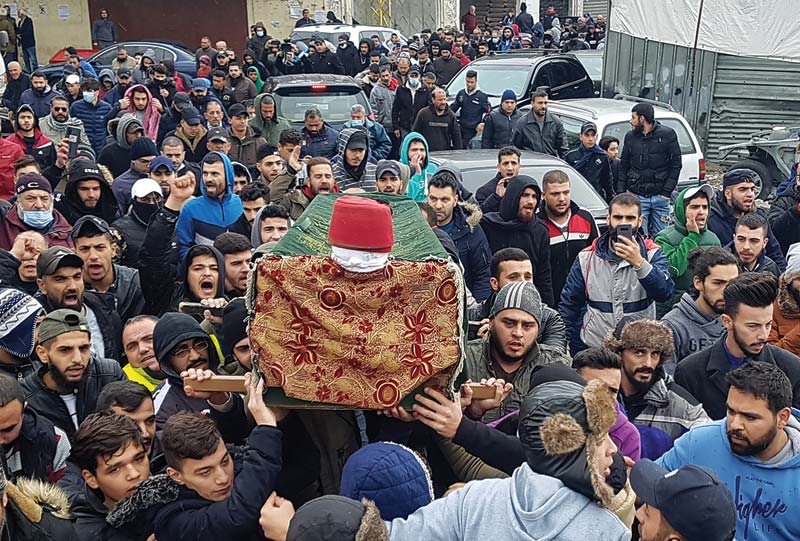 TRIPOLI: Lebanese mourners attend the funeral of Omar Tayba, who died during clashes between anti-government protestors and security forces the previous night, in the northern port city of Tripoli yesterday.-AFP
TRIPOLI: Lebanese mourners attend the funeral of Omar Tayba, who died during clashes between anti-government protestors and security forces the previous night, in the northern port city of Tripoli yesterday.-AFP
TRIPOLI: A man died of his wounds yesterday in Lebanon after clashes between security forces and protesters angered by the combined impact of a severe economic crisis and a coronavirus lockdown. Omar Tayba sustained a bullet wound late Wednesday when protests in the northern city of Tripoli turned violent for the third night running, his brother Ahmad told AFP.
"My brother was in Tripoli watching the protests when he was hit," he said. "He was transferred to hospital and died this morning. The 29-year-old man, who was employed in a bakery, became the first fatality-reported also by local media-of the protests that erupted earlier this week in Tripoli.
According to the National News Agency, a total of 226 people received treatment Wednesday night. Tripoli was already one of Lebanon's poorest areas before the coronavirus pandemic piled new misery onto a chronic economic crisis. Many of its residents have been left without an income since Lebanon imposed a full lockdown earlier this month in a bid to stem a surge in Covid-19 cases and prevent its hospitals from being overwhelmed.
A round-the-clock curfew is in force nationwide and grocery shopping is restricted to home deliveries-a service that is often unavailable in poorer areas. Authorities have extended the lockdown by two weeks to February 8. The UN agency for Palestinian refugees expressed hope yesterday that the United States will resume its funding, but said it still would not be enough to cover a shortfall.
Under former president Donald Trump, the United States halted its support for the UN Relief and Works Agency for Palestine Refugees in the Near East, or UNRWA. On Tuesday, Washington's interim UN envoy Richard Mills said President Joe Biden intends to "restore US assistance programs that support economic development and humanitarian aid for the Palestinian people", without mentioning UNRWA.
"We welcome the Biden administration's decision to restore assistance to Palestinians and look forward to continuing conversation with them about resumption of aid to UNRWA," said the UN agency's spokeswoman, Tamara Alrifai. Alrifai said the "2021 financial year looks very difficult". "While the overall budget will remain at $806 million, same as 2020, the income forecast in the best estimates will lead to an expected shortfall equivalent to three months of operations. "We therefore expect a cashflow crisis as of March this year.
More broadly, the expected deficit would be untenable and could lead to a financial collapse of the agency," Alrifai said. "Our financial forecast takes into consideration the expected re-engagement of the US administration, so we predict a bit more income than 2020 but this slightly improved income will not cover the huge liabilities that UNRWA already has." The agency had entered 2021 with liabilities of $75 million from the last financial year, and its annual deficit was expected to reach $200 million in the current year, she added.
Before it withdrew its support for UNRWA, the US was the largest contributor to the UN agency to the tune of $365 million, or nearly 30 percent of its annual budget. In November, UNRWA commissioner general Philippe Lazzarini said the agency faced a $70 million funding shortfall that had jeopardized its ability to pay its staff full salaries in November and December. UNRWA, whose 28,000 employees are mostly refugees, provides services such as education and healthcare to more than five million Palestinians in camps in Jordan, Syria, Lebanon and the Palestinian territories. - AFP




